
Love it or hate it, small talk is a necessity
If you cringe at the idea of making small talk during social situations, you’re not alone—and you may be missing out. “Small talk gets a bad rap sometimes as being boring or pointless, but chatting about everyday things with others builds the little connections that keep a community strong,” says Jeff Temple, PhD, a licensed psychologist and professor of community health at the University of Texas Medical Branch. “We all have a need to feel seen and heard, even if that’s just by the person at the coffee shop.”
But there are times when even well-intended small talk can go really wrong. A social interaction that happened a few years ago in a Costco checkout line will live in my mind forever: A kind-looking woman noticed my three rambunctious boys and asked if they were brothers. When I said they were, she replied, “Oh, but they all look so different! Do they have the same dad?” An awkward silence followed while I tried to figure out how best to answer that question. I have no doubt that she was just trying to make polite small talk and compliment my kids, but her question implied things about my fertility, my relationship history, my sex life and other impolite topics.
And that’s the problem: Sometimes chit-chat topics intended to be polite ends up being the opposite—and it can happen to the nicest people! Worrying about possibly offending someone may lead you to avoid small talk altogether, fearing that you’re “bad” at it, but you don’t need to stress, says Temple. “Small talk is a valuable skill, and anyone can learn the art of small talk by following a few simple guidelines.”
Knowing the proper etiquette for small talk is just as important for maintaining healthy relationships as it is for talking about aging and mental health, and social anxiety. So what are those etiquette rules, exactly? Our experts break it down for you, sharing the subtle missteps you might be making—and what to say instead, including the best conversation starters.
Get Reader’s Digest’s Read Up newsletter for more etiquette tips, humor, cleaning, travel, tech and fun facts all week long.
The Worst Small Talk Topics
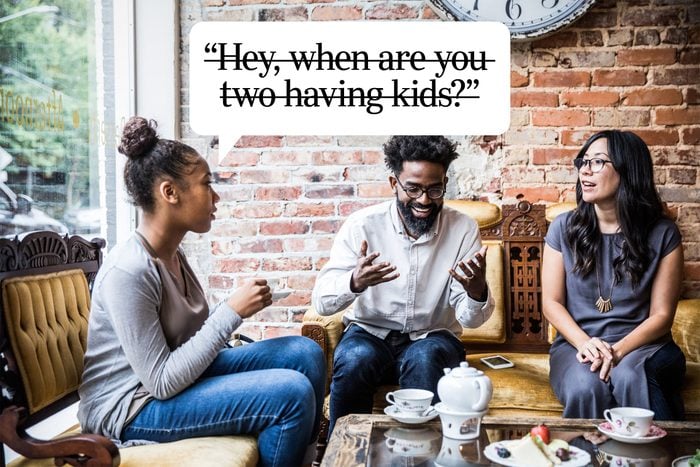
“Hey, when are you two having kids?”
What you mean: I love you guys as a couple, and I think you’d make great parents! I’m excited for you to have a family someday.
What they hear: When are you guys going to have sex? Are you pregnant yet? And can I be a part of this super-private and personal decision?
“As a newlywed couple, we get this question a lot, and it always makes me feel embarrassed and insecure,” says Juliya Hendricks, 34, of Georgia. “I feel a lot of pressure as an ‘older’ wife to prove I’m still fertile. I’ve started to dread family events because someone inevitably asks this, or ‘Do I see a lil’ baby bump?'”
There is no polite way to ask this question because even though you mean well, this isn’t any of your business and can be a sensitive topic, Temple says, adding that there are a host of other factors that go into the decision to have children that you may not be privy to. For instance, the couple may have fertility problems, financial struggles or a lack of interest in having kids. In short, broaching this topic is a major etiquette mistake isn’t good small talk.
Say this instead: “You two make such a great couple, and I’m excited to see what the future holds for you. What are your plans?” This leaves it open to them as to whether they want to share something from their personal life, like a pregnancy, or something else, like education or career plans.

“Where are you really from?”
What you mean: I notice something different about you, and I’m curious about you.
What they hear: You look or sound different, so you must not be from here.
“I was born in South Korea and adopted by my very white parents when I was a baby, so I was raised entirely in the U.S.,” says Leo Patrick, 28, of Michigan. “But because I look Korean, people are constantly surprised that I speak perfect English, even though it’s my first language. When I say I’m from Michigan, they’ll reply, ‘No, but where are you really from?’ It makes me feel like I’ll always be seen as an outsider and I don’t belong.”
This is an example of a microaggression—a type of slight that emphasizes how someone is different from the norm, says Rachana Adyanthaya, an expert in modern etiquette and co-host of a podcast on etiquette.
Say this instead: “It’s so nice to meet you! Tell me a little bit about yourself.” The point of small talk is to find commonalities, not to satisfy your personal curiosity, Adyanthaya says. So ask open-ended questions that will help you get to know the other person in some way. This is also good advice for other situations in which you’re attempting to find the perfect thing to say.

“You’re so smart and pretty—why don’t you have a boyfriend?”
What you mean: I think you’re beautiful and smart—and a great catch.
What they hear: Does anyone love you? What’s so wrong with you that you don’t have a relationship?
“This is a favorite question of my aunts’, asked every time I visit home from college,” says Caroline Messner, 20, of Virginia. “I know they just want good things for me, and I appreciate the compliments, but it makes me feel like I have to be in a relationship to be successful in their eyes. Like, they never ask me about school.”
Repeat after us: It’s none of your business. “This is one situation where you really want to be careful not to overstep the mark because someone’s relationship status is personal,” Adyanthaya says. Beyond that, you want to be careful about how you talk about gender. For all you know, the person isn’t interested in dating men—or isn’t interested in romantic relationships in general.
Say this instead: “You are so smart and beautiful, and I adore you! What’s new in your world?” It’s important to be genuine when asking personal questions, as people can sense when you have an ulterior motive, Adyanthaya adds.
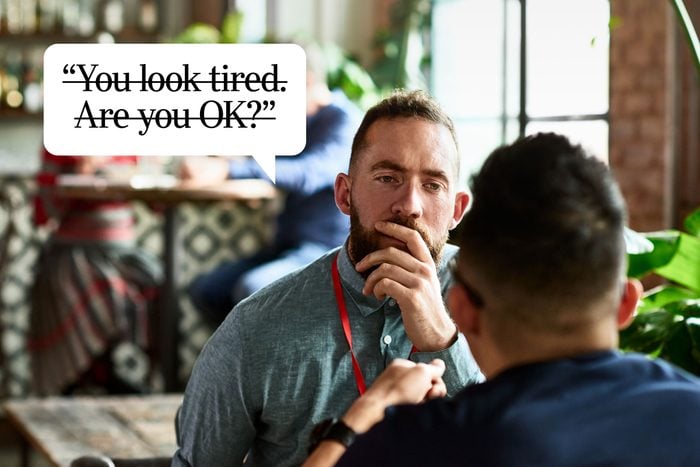
“You look tired. Are you OK?”
What you mean: I’m concerned about you, and I want you to know I care.
What they hear: Something is clearly wrong with you, and everyone can see it.
How someone will receive this question depends in large part on the context in which you say it, Temple says. For instance, if you come across a good friend rubbing their forehead and sighing, asking if they’re OK is totally appropriate. But saying this to a co-worker or the store clerk comes across as aggressive and judgmental, he says.
“Whenever I don’t wear makeup to work, someone inevitably asks me if I’m sick or tired,” says Michelle Wagner, 44, of Utah. “I have natural eye bags—it sucks, but it is what it is. Stop asking me if I’m OK!”
Say this instead: “How are you doing today? I just want you to know I’m thinking about you.” There are many ways to express your care and concern for someone, so keep your question as open as possible. Let them tell you how they feel, and then reflect that back to them. Make a mistake? Don’t beat yourself up for it—here’s how to apologize.

“That looks like it hurt. What happened?”
What you mean: That’s a big scar! It must have an interesting story, and I’d love to hear about it.
What they hear: That thing on your body is very noticeable, and it freaks people out.
“I have a scar on my upper lip from a cleft palate surgery I had as a baby,” Patrick says. “And yes, I am self-conscious about it. I tell myself that most people don’t notice it, so when someone says, ‘OMG, what happened to you?!’ it makes me think everyone really is staring at it.”
It’s normal to be curious about scars, birthmarks, limb differences or other things that make someone stand out, but asking what’s wrong with someone is not the polite way to talk about disability. Instead, wait for them to tell you. Some people are comfortable talking about past injuries, surgeries or disabilities, while others aren’t—and you should respect that either way.
“Remember, your body language plays as much of a role in how genuine your question comes across,” Adyanthaya says. For instance, if your eyes get big and you keep staring at the scar with a troubled look on your face, it won’t matter how politely you ask because you’re already making them uncomfortable.
Say this instead: “That’s a cool scar. I’d love to hear the story sometime if you want to share.” It’s still best to wait for the person to tell you themself, but if you have a close relationship, it’s OK to ask a short, open question. But don’t make assumptions or judgments, Adyanthaya adds.
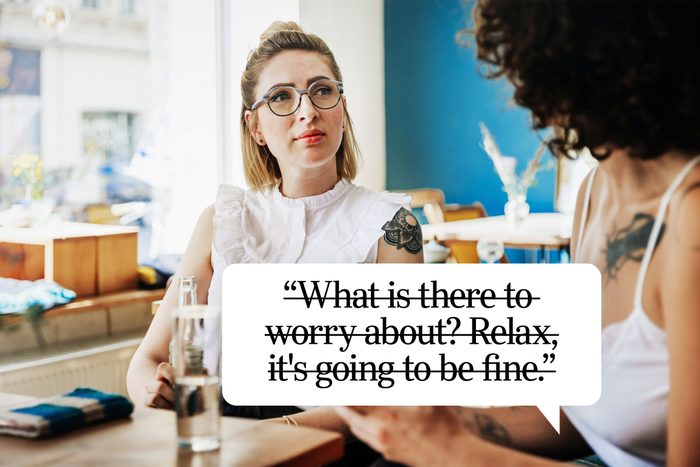
“What is there to worry about? Relax, it’s going to be fine.”
What you mean: I don’t want you to feel stressed! I care about you and want to reassure you that you’ll be OK.
What they hear: Your worries are silly, and I think you’re being dramatic.
“Never in the history of ever has telling someone to stop worrying actually made them stop worrying,” Temple says. He adds that this kind of question invalidates a person’s real and normal feelings and can even be gaslighting in a way. “You’re basically telling them that their feelings are wrong and they should feel a different way,” he says.
Messner says this is a common question in her family. “My parents pride themselves on being really positive, glass-half-full folks, but it just means that I feel like I can’t talk to them about my concerns,” she says.
Say this instead: “Tell me what you’re worried about. I’d love to listen.” A lot of times, people just need someone to listen to them—not give advice or attempt to fix things, Temple says. Don’t want to annoy those around you? Skip the toxic positivity and lend a sympathetic ear instead.
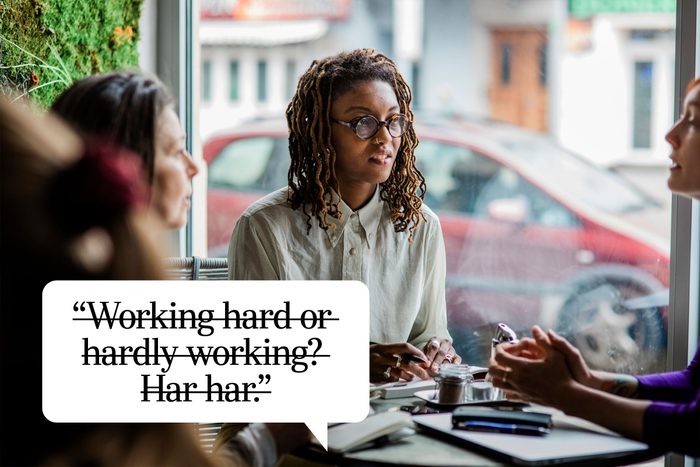
“Working hard or hardly working? Har har.”
What you mean: I am trying to make small talk about your job, and this is funny … right?
What they hear: I think you’re lazy or not doing your job properly.
“I have a manager who says this at least once a week, and it drives me nuts,” says Paul Anderson, 49, of Minnesota. “It isn’t funny and makes me wonder what he really thinks of me. I just want to yell, ‘Of course I’m working hard! I’m always working at work!'”
This joke and other eye-rolling bits are common small talk in work situations. (So common, in fact, that telling the joke ranks as one of the top “polite” habits baristas secretly dislike.) While humor can be a great icebreaker, this one has implications that are easily taken the wrong way, Adyanthaya says. Go for a more universal type of humor or skip it altogether.
Say this instead: “Want to hear a dumb joke? What do you call a fish with no eyes? A fsh!” Not everyone will laugh at that joke, but at least you’ll avoid using an oft-repeated line that has the potential to offend. Another option: Diffuse a workplace situation with these office jokes.
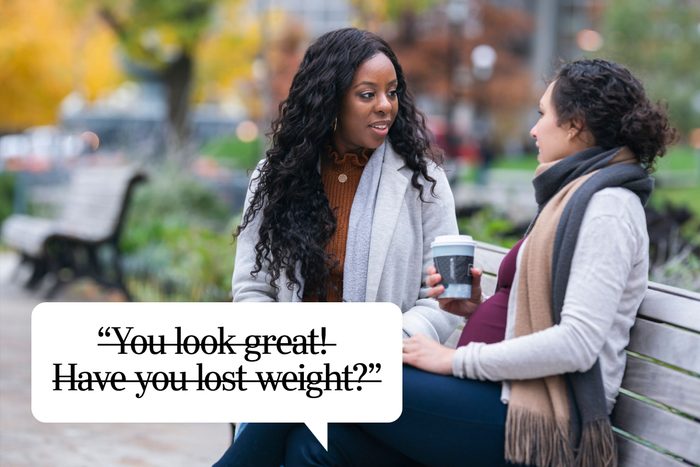
“You look great! Have you lost weight?”
What you mean: You look fantastic, and I am curious about what changed.
What they hear: You have to lose weight to look good.
This isn’t the compliment you mean it to be. Comments about weight are almost never appropriate or appreciated, even from close family members, Temple says. “Our society puts a lot of weight—pun intended—onto weight, and beauty standards are often tied to the number on the scale,” he explains. In fact, many of the “polite” ways people talk about weight are straight-up rude.
“My weight has gone up and down quite a bit over the years, and I’ve gotten lots of comments about it—praise when I lost weight and judgment when I gained weight,” Wagner says. “All of it feels bad. Even if it’s a compliment.”
Say this instead: “You look so happy! What’s new in your life these days?” Don’t bring up weight at all. If they want to share their weight loss with you, they will, and then you can ask follow up questions if you like, Temple says.
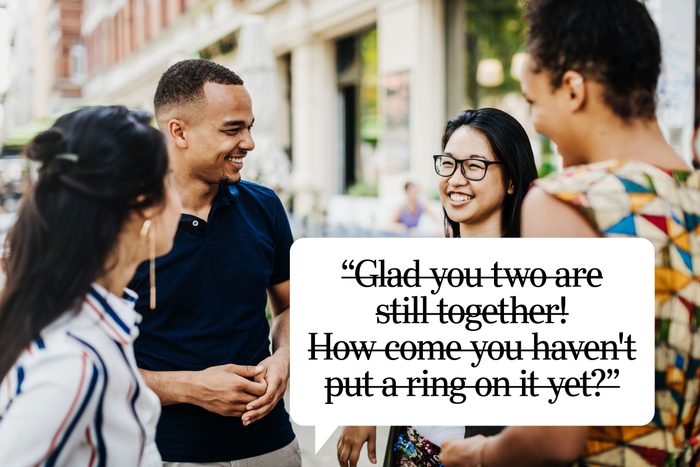
“Glad you two are still together! How come you haven’t put a ring on it yet?”
What you mean: You guys are a cute couple, and I’d love it if you got married.
What they hear: I’m judging your relationship and pressuring you to get married, and you have to be married to have a “real” relationship.
Similar to asking when someone’s having kids or why they aren’t in a relationship, this seemingly polite question hits at a deeply personal choice. The couple has a good reason they’re not engaged, but they aren’t obligated to share it with you. And your asking can put undue pressure on them, Adyanthaya says.
“We dated for six years, which was a long time in our circle, so we got this question a lot,” Hendricks says. “It always made me uncomfortable, and my boyfriend—now husband—got so tired of it that he’d just laugh and say, ‘Oh, is that what we’re supposed to do next? I had no idea!'”
Say this instead: “You two are such a lovely couple! What adventures are you looking forward to together?” This lets them share any big goals, from an upcoming trip to starting a business to, yes, even an engagement. And if they do tie the knot, make sure you’re current on proper wedding etiquette so you can avoid missteps.
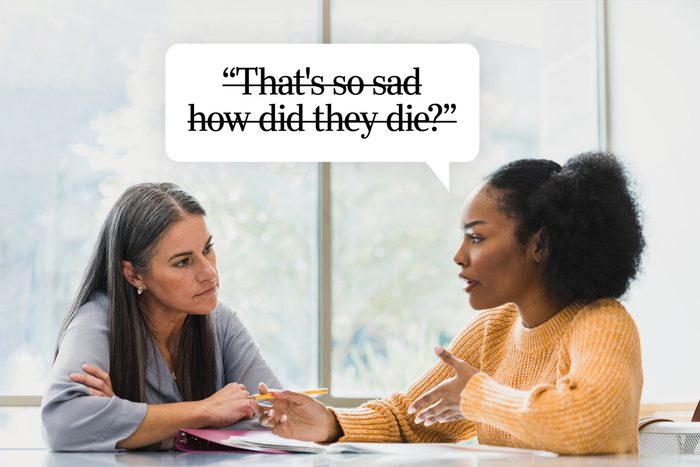
“That’s so sad—how did they die?”
What you mean: I’m so sorry to hear about the death of your loved one, and I’m curious about what happened.
What they hear: Please relive one of the most upsetting moments of your life to satisfy my curiosity.
“We had a baby die at home, and people had so many questions, asking if it was due to SIDS [sudden infant death syndrome] or an accident or even something wrong with my wife’s breast milk,” Anderson says. “I get that babies aren’t supposed to die, so when it happens everyone just wants answers, but those questions made it feel like it was something we could have prevented if we’d just tried.”
Wanting to know how someone died is very natural, but asking about the cause ultimately isn’t helpful to their loved ones. When a death has occurred, your No. 1 job is to be supportive, Temple says. This is doubly true if the death was a suicide.
Say this instead: “I’m heartbroken for you and your family. How can I support you right now?” If the family of the deceased wants people to know the cause of death, they will share it. Otherwise, stick with words of encouragement and condolence messages—don’t ask.
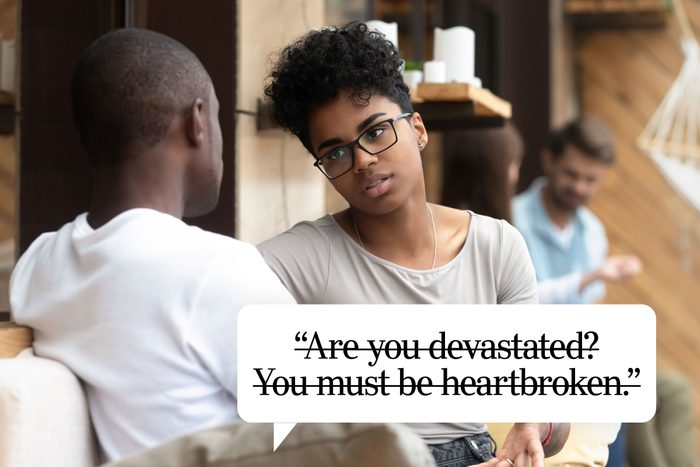
“Are you devastated? You must be heartbroken.”
What you mean: I heard about your loss, and I’m so sorry.
What they hear: You should feel a certain way about this big loss in your life.
If someone has suffered an immense loss, like the death of a loved one or even the death of a pet, their feelings will be complicated. In fact, they may not be feeling sad at that moment but rather angry or in denial, and none of those are wrong. “Asking them about a specific feeling risks making them feel like they are grieving wrong,” Temple says.
Knowing what to say to someone who’s grieving is, admittedly, difficult. But you don’t want to make them feel worse with a clumsy conversation starter.
“When our baby died, a lot of people assumed I was feeling a certain way and would ask about my grief. At that time, my grief was 100% pure anger, but I felt like I couldn’t say that because I was supposed to be sad,” Anderson says. “I think they meant it to be helpful, but it added more hurt to an already painful situation.”
Say this instead: “I’m so sorry for your loss. How can I help you right now? Can I take you out for coffee or bring you a meal?” When all else fails, be honest that you can’t find the words. “If you are struggling to find the right thing to say, admitting that you don’t know what to say is enough to show that you are processing it and feel for the other person,” says Adyanthaya.
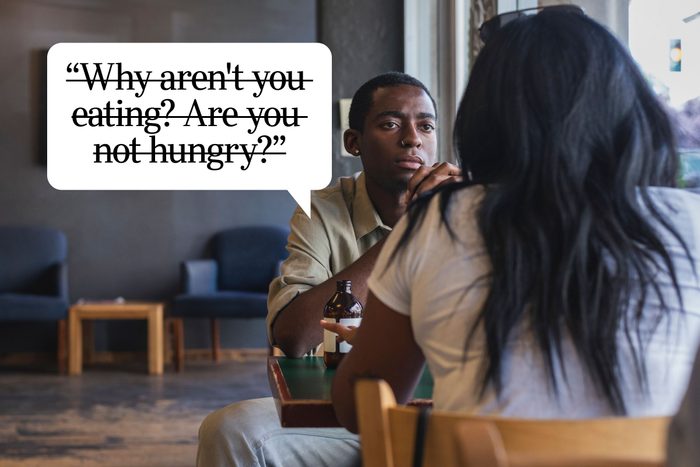
“Why aren’t you eating? Are you not hungry?”
What you mean: I’m concerned that you aren’t eating, and I want to make sure you’re comfortable.
What they hear: I notice what you’re eating, and I’m judging you.
Comments about eating, not eating, particular foods, food allergies and the like are generally not well received, no matter how well intended they may be, says Adyanthaya. They can be especially upsetting to people dealing with an eating disorder or an illness that makes eating difficult.
Adults should be able to make their own decisions about what, when and how they eat without being scrutinized by others—even others who really care about them.
“As a fat kid, I’ve gotten comments about my eating habits my entire life, and even though I’m an adult now, even innocent questions take me right back to that place,” Wagner says. “And I hate feeling like people are watching me eat, even people trying to be ‘helpful.’ I have enough food issues without theirs too.”
Say this instead: “I’m so glad you’re here! If you need anything, just ask.” Avoid discussing the person’s food or eating habits—that’s bad table manners—and instead talk about what you’re doing together.

“Do you have cancer? You’re such a fighter!”
What you mean: You look thin or don’t have any hair, so you must be sick.
What they hear: I look noticeably sick, and my personal health struggles are public.
Let’s get one thing straight: Too many people equate “bald” with “cancer,” but there are many conditions that can cause people to lose hair, and other people just enjoy wearing wigs or hats for fun. But the real problem with this query, Temple says, is that you’re asking about a personal health condition. Again, curiosity is normal, but file this one under Things That Aren’t Any of Your Business.
“Many people with cancer also dislike the ‘fighter’ or ‘warrior’ way of talking about it,” he adds. “Because not everyone feels like they are fighting. And what about the people who die of their cancer? Does that mean they weren’t fighters?”
Say this instead: “How are you feeling these days?” If you’re talking to a stranger, skip any question about health conditions, Temple says. But if it’s a close friend or loved one, it’s appropriate to ask how their health is or how they’re feeling, then let them decide how much they want to open up. Here are some more tips on how to talk to anyone according to experts.
More From Etiquette:
- How Much to Tip Hairdresser
- Tips for Hotel Housekeeping
- How Much to Tip
- How Much to Tip for a Massage
- How To Host a Party
- Restaurant Etiquette
- Proper Etiquette
- Business Casual Etiquette
- Wedding Toast Examples
- What is an Irish Exit?
- What to Say in an Interview
- Email Etiquette
About the experts
- Jeff Temple, PhD, is a licensed psychologist and professor, as well as the John Sealy Distinguished Chair in Community Health at the University of Texas Medical Branch. He has more than 230 scholarly publications in a variety of high-impact journals, including JAMA.
- Rachana Adyanthaya is an expert in modern etiquette. She’s the co-host of the popular etiquette podcast Manners Matter 2.
Sources:
- Juliya Hendricks of Georgia
- Leo Patrick of Michigan
- Caroline Messner of Virginia
- Michelle Wagner of Utah
- Paul Anderson of Minnesota
